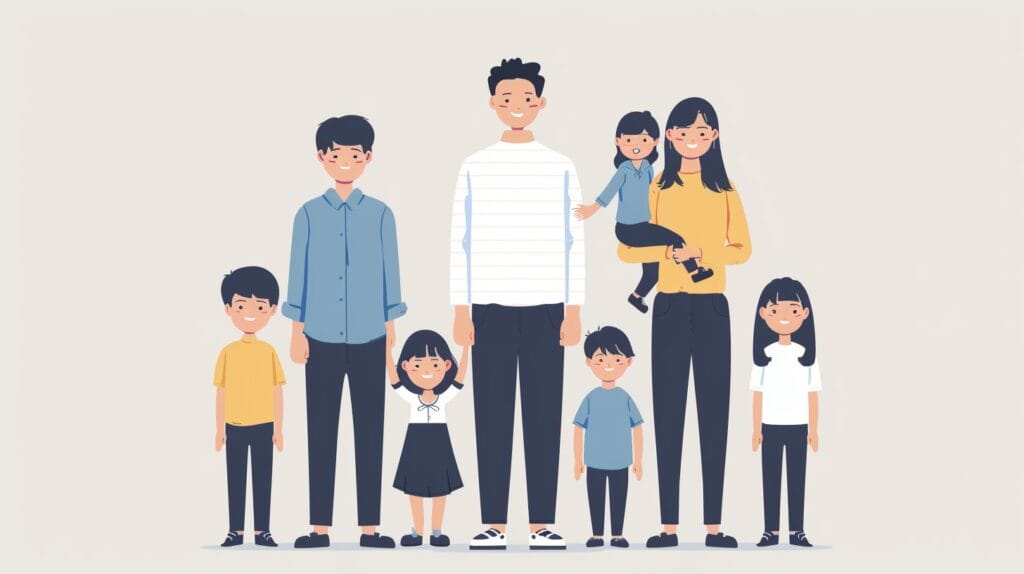
Ever pondered the key to fortifying family ties amid life’s bustle? Explore fun, engaging methods to nurture family bonds, cherished traditions, and quality time.
Join our journey to embrace family meetings, shape children’s experiences, and infuse joy into daily life. Let’s cultivate deeper togetherness and lasting memories in our homes.
- 1. Intergenerational Understanding and Respect
- 2. Shared Values and Traditions
- 3. Emotional Bonds Within the Family
- 4. Open Communication and Conflict
- 5. Building Trust and Support
- 6. Creating Family Time and Activities
- 7. Empathy and Compassion in the Family
- 8. Celebrating Individual Strengths
- 9. Supporting Each Other
- 10. Diversity and Unity in the Family
- 11. Balancing Autonomy and Togetherness
- 12. Strengthening Family Bonds
- 13. Belonging and Security in the Family
- 14. Transitions and Changes as a Family
- 15. Building Resilience and Adaptability
- 16. Establishing Healthy Boundaries
- 17. Forgiveness and Healing
- 18. Strengthening Parent-Child Bonds
- 19. Supportive and Loving Environment
- 20. Growth and Development
- 21. Active Listening and Understanding
- 22. Belonging and Inclusivity
- 23. Sibling Relationships
- 24. Change and Growth Together
- 25. Milestones and Achievements
- Family Bonding: A Recap

1. Intergenerational Understanding and Respect
Family bonding thrives on intergenerational understanding and respect, fostering strong family relationships and bonds across generations. Through intentional family meetings and the creation of a family mission statement, values are upheld and shared goals are established. Spending quality time together, whether through family vacations tailored to each child’s interests or sharing family meals, deepens connections and strengthens bonds.
Engaging in family bonding activities that cater to the diverse interests of all family members promotes unity and harmony within the family unit. By prioritizing intergenerational understanding and respect, families cultivate a supportive and nurturing environment that enriches the lives of every family member and strengthens the foundation of their familial relationships.
2. Shared Values and Traditions
In the tapestry of everyday life, shared values and traditions form the sturdy threads that weave familial relationships together. Whether it’s a weekly game night or an annual camping trip, these rituals offer a sense of continuity and belonging. They provide teenagers with a sense of stability and reinforce healthy relationships within the family unit.
Engaging in fun activities fosters mental well-being and bolsters self-esteem, creating meaningful relationships that transcend generations. Establishing a family mission statement can serve as a guiding light, ensuring that time spent together is purposeful and enriching. By prioritizing shared values and traditions, families can carve out moments of joy and connection amidst the busyness of modern life.
3. Emotional Bonds Within the Family
In the whirlwind of busy schedules, nurturing emotional bonds within the family becomes paramount. Strengthening family ties involves fostering open communication skills and carving out dedicated bonding time amidst the chaos. Whether it’s through game nights, movie marathons, or engaging in shared family activities, such moments promote mutual respect and understanding. Establishing traditions, like scavenger hunts or regular dinner table conversations, not only creates lasting memories but also promotes bonding.
As children grow, these interactions contribute to their emotional development, cultivating strong family connections that withstand the test of time. By prioritizing quality time and meaningful interactions, families can navigate life’s challenges with unity and resilience.
4. Open Communication and Conflict
Open communication and effective conflict resolution are essential pillars in nurturing strong family relationships and bonds. Amidst busy schedules and daily chores, setting aside dedicated time for family meetings or bonding activities like game or movie nights fosters a sense of togetherness. By encouraging each family member to express their thoughts and feelings with mutual respect, conflicts can be addressed constructively.
These moments not only strengthen family bonds but also provide opportunities for learning and growth. Embracing open communication allows for the resolution of conflicts in a supportive environment, promoting understanding and empathy among family members. Through shared experiences and quality time spent together, families can cultivate deeper connections and navigate challenges with resilience, strengthening the fabric of their familial bonds.
5. Building Trust and Support
Building trust and support among family members is essential to strengthen family bonds. Mutual respect promotes bonding and creates a safe space for individuals to express different ideas. Establishing traditions, both old and new, fosters a sense of belonging and unity within the family. By providing a strong foundation of trust and support, families can navigate challenges together and celebrate successes as a cohesive unit.
Encouraging open communication in a fun way allows family members to share their thoughts and feelings, fostering deeper connections. Ultimately, building trust and support among family members cultivates a strong family dynamic where everyone feels valued and respected.
6. Creating Family Time and Activities
In today’s fast-paced world, dedicating time to family activities is crucial for nurturing bonds and fostering togetherness. Family meetings promote open communication, reinforcing positive dynamics and boosting self-esteem. Sharing meals cultivates family bonds while encouraging healthy habits and supporting mental well-being. Whether through game nights or cozy movie evenings, these traditions create lasting memories and enhance family time.
Vacations offer a break to reconnect and create new experiences. Engaging in fun activities improves communication skills and overall well-being. Prioritizing family bonding time brings invaluable benefits: improved mental health, stronger relationships, and a deeper sense of belonging within the family unit.
7. Empathy and Compassion in the Family
Empathy and compassion within the family form the cornerstone of a strong familial bond. Encouraging mutual respect and understanding creates a safe space where each family member feels valued and heard. By fostering empathy, children learn to recognize and appreciate the feelings of others, promoting bonding and cooperation.
Establishing traditions centered around compassion reinforces the importance of kindness and empathy in daily interactions. These traditions not only strengthen family ties but also instill a sense of belonging and support within the family unit. Ultimately, empathy and compassion create a nurturing environment where family members thrive, fostering a sense of unity and resilience in the face of life’s challenges.
8. Celebrating Individual Strengths
Recognizing and celebrating individual family members’ strengths is crucial for fostering a supportive and harmonious family environment. By acknowledging each person’s unique talents, interests, and contributions, families cultivate a sense of belonging and appreciation. Whether it’s praising a child’s creativity, honoring a parent’s resilience, or applauding a sibling’s compassion, highlighting these strengths reinforces self-esteem and encourages personal growth.
This practice promotes mutual respect and understanding within the family, fostering a culture of support and encouragement. By valuing each person’s strengths, families build stronger connections and a foundation for shared success and happiness
9. Supporting Each Other
In times of adversity, family bonding becomes paramount as family members rally together to support one another through life’s challenges. Whether it’s navigating difficult decisions, coping with loss, or facing unexpected obstacles, the strength of family relationships serves as a steadfast anchor.
Children learn resilience and emotional intelligence by witnessing the unwavering support within their family unit. From lending a listening ear to offering practical assistance, each gesture reinforces the bonds of trust and love. Through shared experiences and mutual encouragement, families emerge stronger, unified by the collective determination to overcome adversity. Together, they navigate life’s twists and turns, finding solace and strength in the unwavering support of their family.
10. Diversity and Unity in the Family
In every family, diversity is not just a reality but a strength, bringing unique perspectives and experiences. Through regular family meetings and quality time, each family member contributes to a shared tapestry of traditions and bonding experiences. These moments of togetherness not only strengthen family bonds but also promote mental health and well-being. Embracing diversity within the family unit fosters unity, teaching children the value of acceptance and understanding.
Whether it’s through cherished traditions or spontaneous family fun, these moments of connection create a foundation of love and support that resonates throughout generations. In celebrating our differences and shared experiences, we cultivate a culture of unity and resilience within our family.
11. Balancing Autonomy and Togetherness
In family dynamics, striking a balance between autonomy and togetherness is paramount. It involves nurturing each family member’s autonomy while fostering a strong sense of unity. By encouraging children to pursue their interests and passions, while also spending quality time together, families can create a harmonious environment. Implementing activities like scavenger hunts or establishing a family mission statement can strengthen bonds and provide structure to family life.
Moreover, fostering open communication at the dinner table allows for shared experiences and contributes to children’s growth and development. Ultimately, finding this balance ensures that each family member feels valued and supported while collectively growing and thriving together.
12. Strengthening Family Bonds
Strengthening family bonds through acts of kindness and service cultivates a sense of unity and empathy within the family unit. Engaging in activities such as volunteering together or performing random acts of kindness not only benefits others but also fosters a deeper connection among family members.
Involving children in such endeavors teaches them valuable lessons about compassion and generosity, instilling important values from an early age. Whether it’s participating in school activities, playing board games, or brainstorming different ideas for helping others, these experiences create lasting memories and strengthen family ties. By integrating acts of kindness into daily life in a fun and engaging way, families can build stronger bonds while making a positive impact on their community.
13. Belonging and Security in the Family
Belonging and security within the family foster a sense of mutual respect and promote bonding among its members. Establishing traditions and maintaining open communication channels create a safe space where familial relationships can thrive. A strong family unit provides a foundation for children to develop self-esteem and meaningful connections.
Introducing new traditions reinforces the family’s mission statement, instilling values and strengthening the bond between generations. Spending quality time together nurtures healthy communication skills and deepens the sense of belonging.
By prioritizing these aspects, families cultivate an environment where everyone feels valued and supported, fostering enduring bonds that withstand the trials of life. In such a nurturing atmosphere, individuals can flourish, knowing they have a loving and secure family to lean on in times of need.
14. Transitions and Changes as a Family
In family life, transitions are inevitable, impacting both parents and children. Whether it’s moving to a new home, welcoming a new sibling, or navigating adolescence, these changes bring excitement and challenges. Children may struggle with adapting, experiencing anxiety or confusion.
As caregivers, providing support and reassurance is vital, fostering open communication. By acknowledging the challenges and opportunities transitions bring, families navigate change together, strengthening bonds and fostering resilience. Embracing transitions leads to growth, understanding, and a deeper appreciation for each other.”
15. Building Resilience and Adaptability
Building resilience and adaptability within children and the entire family is a vital aspect of navigating life’s challenges. Engaging in family bonding activities cultivates a supportive environment where members learn to overcome obstacles together. Whether through outdoor adventures, creative projects, or shared hobbies, these activities foster a sense of teamwork and mutual encouragement.
By facing challenges as a unit, children develop essential life skills such as problem-solving, communication, and emotional regulation. Through these experiences, families not only strengthen their bonds but also build resilience, enabling them to adapt and thrive in the face of adversity. Embracing these opportunities for growth creates lasting memories and equips families with the resilience needed to weather life’s storms.
16. Establishing Healthy Boundaries
Establishing healthy boundaries within the family is vital, fostering harmony and mutual respect. It entails defining personal limits and responsibilities in a supportive manner. Open communication helps understand each other’s needs, reducing conflicts.
Setting boundaries teaches essential life skills, fostering self-discipline and respect, crucial for children’s development. Moreover, it cultivates security and trust, enabling authentic expression. Through ongoing dialogue, healthy boundaries become integral, promoting a positive family environment.
17. Forgiveness and Healing
Forgiveness and healing within the family are vital for nurturing healthy relationships and emotional well-being. Resolving conflicts through forgiveness releases resentment, rebuilding trust, and strengthening bonds. Open communication, empathy, and understanding facilitate healing, fostering growth and deeper connections. Cultivating forgiveness promotes harmony, compassion, and resilience, teaching valuable lessons in love.
18. Strengthening Parent-Child Bonds
Strengthening parent-child bonds is crucial for nurturing a supportive family environment and enhancing children’s well-being. Family activities, such as scavenger hunts or game nights, not only foster strong family connections but also create enduring memories.
Regular family dinners facilitate open communication, reinforcing familial ties. Tailoring activities to children’s interests shows care and boosts their self-esteem. Quality time together contributes to children’s emotional well-being, fostering a sense of belonging. Establishing a family mission statement promotes shared values, emphasizing the significance of family bonding. Prioritizing these activities fosters enduring parent-child relationships, creating a supportive environment for growth and development.
19. Supportive and Loving Environment
Within the family, cultivating a supportive and loving environment fosters strong bonds and nurtures individual well-being, especially for children. Quality family time, marked by shared experiences and traditions, enriches relationships and enhances mental health.
Regular family meetings provide opportunities for open communication and problem-solving, reinforcing a sense of belonging and unity among family members. Through mutual support and understanding, every family member feels valued and empowered, contributing to a positive family dynamic.
The benefits of such bonding extend beyond the familial unit, impacting individuals’ mental health and resilience in facing life’s challenges. Ultimately, a supportive and loving family environment serves as a sanctuary where each member finds solace, strength, and unconditional acceptance, laying the foundation for lifelong connections and a thriving family community.
20. Growth and Development
Nurturing growth and development through family connections involves prioritizing a child’s interests and spending quality time together. Establishing a family mission statement guides shared values and goals, fostering a supportive environment within family life. Whether it’s a family vacation, a shared meal, or engaging in bonding activities, involving other family members strengthens connections.
By dedicating intentional, quality time to each other, families create opportunities for communication, exploration, and mutual understanding. These experiences not only deepen family bonds but also provide essential support for a child’s emotional and cognitive development, laying a foundation for lifelong connections and resilience.
21. Active Listening and Understanding
Enhancing family dynamics involves active listening and understanding, fostering deeper connections and harmony. Through attentive conversations and empathy, relationships strengthen, and conflicts resolve more effectively.
This practice promotes respect and validation, creating a supportive environment where everyone feels valued. Open communication and genuine empathy help navigate challenges and celebrate successes, building trust and intimacy. Prioritizing active listening cultivates a positive and cohesive dynamic, enriching the overall quality of family relationships.
22. Belonging and Inclusivity
Creating a thriving family dynamic revolves around fostering belonging and inclusivity. Each member should feel valued, respected, and integral to the family unit, fostering open communication and mutual understanding. Embracing diversity within the family enriches bonds, celebrating individuality while promoting unity. Prioritizing inclusivity cultivates resilience and empathy, nurturing a safe space where all members can flourish
23. Sibling Relationships
Strengthening sibling relationships through cooperation and compromise is essential for cultivating strong family bonds. Family dinners provide opportunities for the whole family to come together, share meals, and engage in meaningful conversations.
By prioritizing family time, siblings learn to cooperate and complete chores together, fostering a sense of unity and teamwork in everyday life. Incorporating fun activities and spending time on shared interests nurtures healthy relationships among children and teenagers, contributing to their mental well-being and self-esteem.
Additionally, establishing a family mission statement can guide interactions and reinforce the value of communication skills and mutual respect in familial relationships. When siblings learn to cooperate and compromise, they not only develop meaningful relationships with each other but also contribute to the overall harmony and happiness within the family unit.
24. Change and Growth Together
Change is an inevitable part of family life, presenting both challenges and opportunities. Embracing it together strengthens bonds and builds resilience. Whether it’s welcoming a new member, relocating, or facing life’s transitions, unity and support are essential.
Open communication fosters understanding and empathy, encouraging each member to share feelings and concerns. By approaching change collectively, families cultivate flexibility and adaptability. It offers chances for personal and collective growth, fostering mutual support and a shared commitment to overcoming obstacles. Through patience and dedication, families emerge stronger, more connected, and ready to face life’s changes.
25. Milestones and Achievements
Celebrating milestones and achievements as a family community is an invaluable opportunity to reinforce family bonds and foster a sense of togetherness. As family members come together to acknowledge and applaud each other’s accomplishments, they strengthen their relationships and deepen their connection. Spending quality time engaging in family fun activities during these celebrations not only creates cherished memories but also cultivates a positive environment for bonding.
For children, such experiences contribute significantly to their mental health and well-being, reinforcing the importance of family bonds in their lives. Whether through shared traditions or special family meetings, these moments serve as reminders of the support and love that permeate the family unit. By prioritizing family time and nurturing these traditions, families create a strong foundation built on mutual respect, understanding, and celebration of each other’s successes.
Family Bonding: A Recap
In today’s fast-paced world, prioritizing family time and fostering strong bonds are more vital than ever for overall well-being. Engaging in family bonding activities not only strengthens connections between members but also nurtures unity within the family unit.
Spending quality time together, whether through shared meals, fun activities, or meaningful conversations, creates lasting memories and deepens familial ties. Regularly scheduling family bonding activities ensures alignment amid busy routines.
Strong family bonds extend beyond immediate members to include extended family and community connections. By participating in group outings or gatherings, children learn social skills and the value of cooperation.
Understanding family dynamics and respecting each member’s uniqueness fosters a sense of belonging and unity. Prioritizing family time and nurturing relationships within and beyond the immediate family enriches lives, contributing to lasting happiness and fulfillment.


